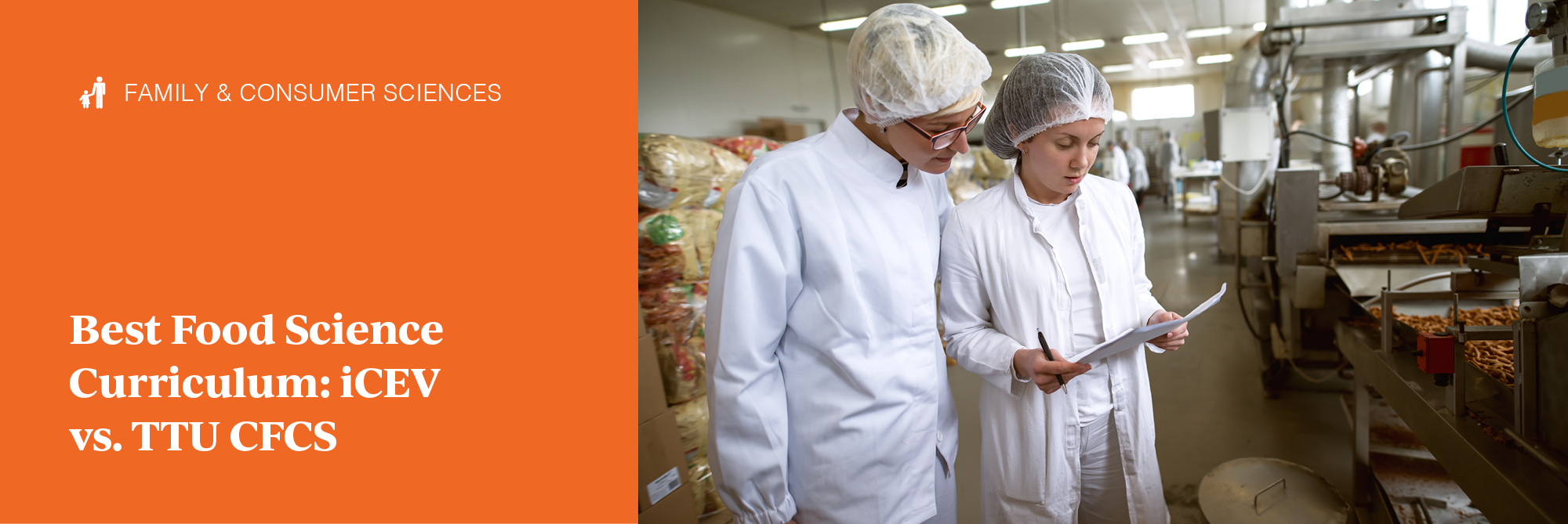High School | Family & Consumer Sciences
Best Food Science Curriculum: iCEV vs. TTU CFCS
After serving as a Texas FFA state officer in 2018, Josh Witherspoon joined the iCEV team as a part-time employee for 3 years before taking on the role of content development specialist in 2022. Witherspoon holds a bachelor's degree in agricultural communications from Texas Tech University, in which his experience and proficiency in writing, marketing and CTE allow him to effectively communicate the successes of CTE educators and students and the value iCEV has to offer.
If you teach food science, finding the best curriculum for your students is of utmost importance. Regardless of whether you’re new to teaching food science or need to find new resources that better meet standards and students needs, choosing the right curriculum will set your students up for success.
Two prominent food science curriculum providers you may have heard of are the TTU Curriculum Center for Family and Consumer Sciences (CFCS) and iCEV. While both offer high-quality food science courses, you may find that one or the other is a better fit for your classroom.
In this article, you’ll explore the differences between TTU CFCS and iCEV’s food science offerings as well as find the answers to commonly asked questions including:
- What food science topics does each cover?
- What is the instructional format of each?
- Who is the intended audience of each?
After reading this article you’ll better understand the differences between both providers so you can make the best curriculum choice for your students and classroom.
What Food Science Topics Does Each Cover?
Understanding what a provider offers within their course is a great place to start in your search for the best food science curriculum.
In this section, you’ll discover more about the courses each provider offers and what you can expect when viewing the curriculum.
Food Science Topics You Can Teach With TTU CFCS
TTU CFCS offers a well-structured Food Science curriculum designed for high school students in grades 11-12. In this course, students conduct field investigations, use scientific methods and make informed decisions using critical thinking and scientific problem-solving.
TTU CFCS uses the platform Blackboard to house the components of this course. Through the platform, teachers gain access to instructional strategies, digital assets like PowerPoints®, fillable PDFs, editable rubrics, as well as links to internet resources and videos.
The curriculum is composed of nine units including:
- Food Science Lab
- Scientific Methods and Equipment
- Chemistry Concepts
- Biological Macromolecules
- Food Safety and Sanitation
- Food Science Fundamentals
- Microbiology of Food
- Food Preservation and Packaging
- Employability Skills
Through each unit, students gain valuable knowledge and applicable skills whether they pursue a career in food science or another industry.
Food Science Topics You Can Teach With iCEV
iCEV offers a comprehensive Food Science course curriculum in which students conduct laboratory investigations as well as use scientific problem-solving to understand principles of food science, processing and the improvement of foods for the consuming public.
The course comes complete with pre-built lesson plans, interactive activities, formative and summative assessments and other materials to engage students in your classroom.
This course is composed of 29 lessons including the following:
- Scientific Procedures & Safety
- Scientific Principles: Chemical Properties
- Scientific Principles: Solutions & Emulsions
- Scientific Principles: Enzymes
- Acids & Bases in Food Science
- Chemical Processes in Food Science
- The Science in Food Handling & Storage
- The Science in Food Preservation
- Value Added & Specialty Products
- Food Packaging Options & Guidelines
- Workplace Issues
- Food Industry Safety
- Sanitation & Safety Procedures in Food Production
- Food Sanitation: Insects & Rodents
- It’s Alive: Foodborne Illness
- Principles of HACCP: Introduction
- Principles of HACCP: Identifying Hazards in Food Processing
- Principles of HACCP: Conducting a Hazard Analysis
- Principles of HACCP: Identifying Critical Control Points
- Principles of HACCP: Establishing & Monitoring Critical Limits & Taking Corrective Actions
- Principles of HACCP: Establishing Verification Procedures
- Principles of HACCP: Recordkeeping
- Principles of HACCP: Ground beef HACCP Plan
- Food & the Government
- A Closer Look at Nutrition: Metabolism & Energy
- A Closer Look at Nutrition: Carbohydrates
- A Closer Look at Nutrition: Fats & Lipids
- A Closer Look at Nutrition: Proteins & Amino Acids
- A Closer Look at Nutrition: Vitamins, Minerals & Water
With this course, learners explore food science concepts and skills through engaging, varied instruction and apply what they learned through innovative hands-on learning experiences that challenge their understanding.
What is the Instructional Format of Each?
While TTU CFCS and iCEV both offer full courses on food science, each provider has its strengths and weaknesses. In this section, you’ll learn more about the instructional format of these digital curriculum options.
Instructional Format of TTU CFCS
Courses produced by TTU CFCS use a combination of videos, text, note-taking taking and short activities to expose students to food science concepts and skills.
Within the course, each lesson includes:
- Educator instructions with instructional strategies
- Links to quality resources and video
- Activities that allow students to synthesize what they learned including fillable PDFs
- Projects to allow students to challenge their understanding
- Strategies that connect to FCCLA as well as core courses including Math and Science
Since the offering is through Blackboard, this allows for functions like announcements, roster management, messages, class collaboration, a video component and discussion forums the entire class can access.
Instructional Format of iCEV
As a comprehensive curriculum solution, iCEV’s Food Science course provides both structure and flexibility for teachers and students while exploring valuable concepts and skills used in the industry.
Within the course, you’ll discover everything you need to start teaching immediately, including flexible, pre-made lesson plans, engaging activities, and a wide variety of other materials to give your students plenty of opportunities to learn and grow.
Materials you’ll find in an iCEV course include:
- Lesson plans providing step-by-step guidance for instructors
- Digital lessons are divided into video-based and presentation-based lessons and are intended to be shown at the front of the class for students to watch and take notes.
- Video-based lessons include slideshows, interviews with subject matter experts, example scenarios, and skill demonstrations.
- Presentation-based lessons include PowerPoint slides and other blocks of instruction students can reference for information.
- Projects and activities designed to increase information retention and engagement
- Formative & Summative Assessments to assess student understanding throughout a lesson or unit
As a comprehensive curriculum solution, iCEV's materials work for any learning environment including in-person, virtual, and hybrid classrooms.
Who is the Intended Audience of Each?
Every curriculum option is unique in design and intended audience. In your search for the best food science curriculum solution for your students, it’s essential to remember who the curriculum is designed for. Knowing this will help you better meet your students’ needs and your instructional goals.
Intended Audience of TTU CFCS
The TTU CFCS Food Science curriculum is a good choice for educators looking for supplemental coursework to implement alongside a more robust curriculum option.
While the instructional content included in this resource is high-quality, it lacks the variety of activities and projects a more comprehensive solution would offer. Educators looking for supplemental resources will find value in taking instructional resources, activities and projects from this option to add variety to a more robust curriculum.
On the other hand, this curriculum is not a good option for educators in search of a comprehensive food science curriculum solution.
The TTU CFCS curriculum has very few activities and projects and offers no assessments, leaving educators with few resources to choose from to keep students engaged. Every student learns in unique ways. Without enough variety in your resources, you may be unable to give every student the best opportunities to learn and grow in your classroom.
Intended Audience of iCEV
iCEV offers single-subscription access to all its comprehensive, standards-aligned Family & Consumer Science curriculum. This means with one purchase, you gain access to all 25 of iCEV’s Family & Consumer Science courses.
For teachers looking for a curriculum solution that offers pre-built lesson plans, engaging multimedia-based lessons, customizable activities, hands-on projects, and assessments, iCEV’s Food Science curriculum could be a solid choice for your students.
On the other hand, if you’re looking for a supplemental resource and don't see yourself utilizing the added features that come with iCEV, this might not be the best choice for you. After all, you don't want to pay for something you aren't sure you'll use.
Which Food Science Curriculum is Best for My Students?
Choosing the right food science course for your students can be challenging. After all, the best fit for your students can be the difference between a rigid course and an engaging and impactful learning experience in your classroom.
If you’re an educator looking for supplemental student coursework to implement alongside a more robust curriculum, TTU CFCS’s food science curriculum might be a good choice for your course.
But for teachers looking for a comprehensive curriculum that offers pre-built lessons, multimedia presentations, engaging activities and assessments, iCEV’s Food Science curriculum could be a better choice for your students.
Does iCEV sound like it might be a good choice for your students? Try it out for yourself through a free trial. Get unlimited access to iCEV’s entire library for 30 days, and start implementing the most innovative career and technical education curriculum available.


